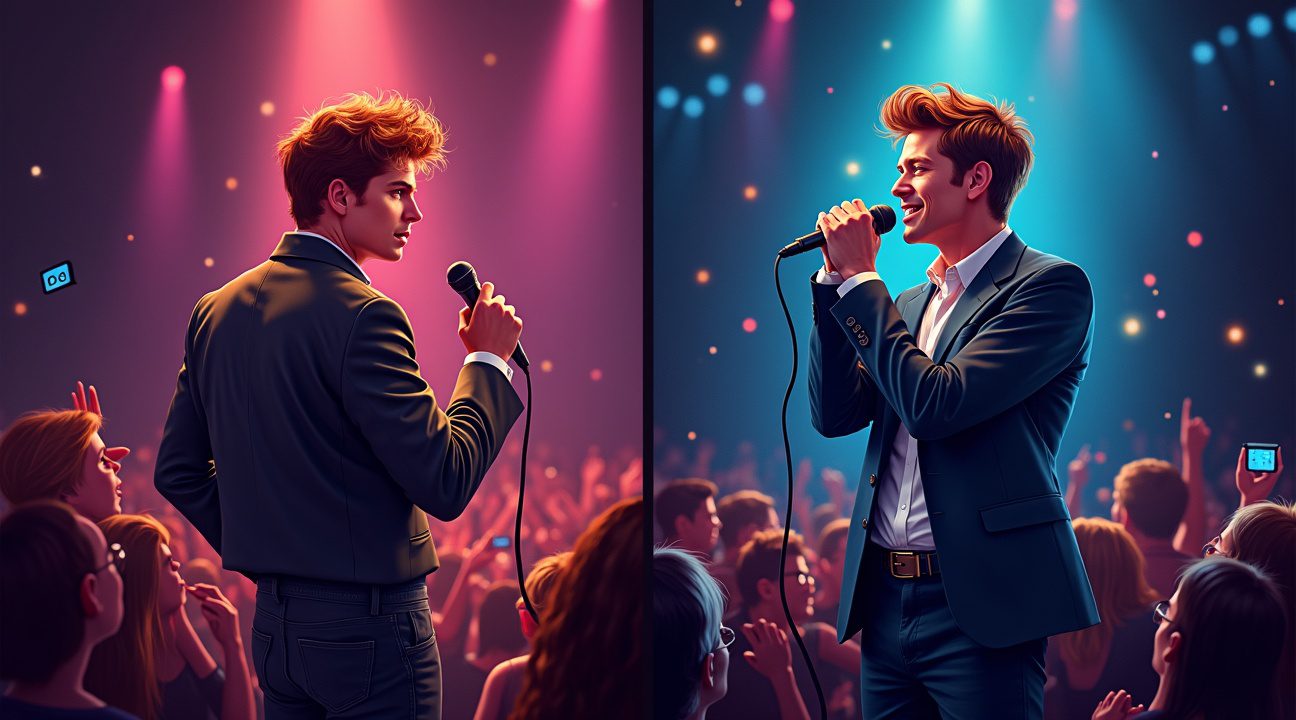Rick Astley has undergone a remarkable transformation from actively avoiding his 1987 hit “Never Gonna Give You Up” to fully embracing it as the crown jewel of his career, culminating in his enthusiastic New Year’s Eve 2024 performance that closed BBC’s prestigious Roundhouse show.
After years of reluctance and even embarrassment about the song’s overwhelming dominance of his public persona, Astley now regularly features the track as the finale of his live performances and has creatively reimagined it through intimate arrangements that showcase his artistic growth.
Key Takeaways
- Astley spent years distancing himself from “Never Gonna Give You Up,” often avoiding performing it live due to feeling that his entire artistic identity had been reduced to this single track.
- The Rickroll internet phenomenon, while initially adding to his reluctance, ultimately helped revitalize his career by introducing him to new generations and accumulating over 1.5 billion YouTube views.
- His 2019 piano arrangement for “The Best of Me” album marked a turning point, transforming the bombastic original into an intimate reinterpretation that demonstrated artistic maturity and creative control.
- The New Year’s Eve 2024 BBC performance at Camden’s Roundhouse symbolized his complete acceptance, as he deliberately chose to close the prestigious broadcast with an energetic rendition of his signature song.
- Astley’s journey demonstrates how legacy artists can successfully reframe their relationship with career-defining hits, using creative reinvention and mature perspective to find new appreciation for their most famous works.
From Chart-Topper to Cultural Phenomenon: The Unstoppable Legacy of a 1987 Hit
Rick Astley’s “Never Gonna Give You Up” burst onto the music scene on July 27, 1987, marking the beginning of what would become one of pop culture’s most enduring phenomena. I find it fascinating how this debut single from his album “Whenever You Need Somebody” transformed from a straightforward pop hit into something far greater than anyone could have predicted.
The creative powerhouse behind this track was the legendary production trio Stock Aitken Waterman, who crafted the song’s distinctive sound that would later become synonymous with late-80s pop perfection. RCA Records released the single, and the response was nothing short of extraordinary. The song didn’t just climb the charts—it dominated them completely.
Global Domination and Record-Breaking Success
The numbers speak volumes about the song’s immediate impact. Reaching Number 1 in an impressive 25 countries, including major markets like the US, UK, and Germany, proved that this wasn’t just a regional hit but a global sensation. I’m particularly struck by its performance in the UK, where it maintained its grip on the top spot for five consecutive weeks.
The accolades continued rolling in throughout 1987 and beyond. Consider these remarkable achievements:
- Best-selling single of 1987 in the United Kingdom
- Five weeks at Number 1 on the UK Singles Chart
- Chart-topping success across 25 international markets
- Winner of Best British Single at the 1988 Brit Awards
What makes this success even more remarkable is how the song has maintained its relevance decades later. While other hits from the era have faded into nostalgia, “Never Gonna Give You Up” found new life in the digital age through the “Rickrolling” phenomenon. This unexpected second act has introduced the track to entirely new generations, proving that great pop music transcends its original context.
The song’s journey from chart domination to internet meme and back to genuine appreciation represents a unique trajectory in music history. Few tracks can claim such sustained cultural impact across multiple decades. Artists today continue to study this formula for creating lasting musical moments.
The 1988 Brit Awards recognition cemented the song’s place in British music history, acknowledging not just its commercial success but its artistic merit. This validation from industry peers highlighted how the track had elevated beyond mere commercial product to become a significant cultural artifact. The combination of Astley’s distinctive vocal delivery and the production team’s innovative approach created something truly special that continues to resonate with audiences worldwide.

How the Rickroll Meme Transformed a Pop Classic into Internet Gold
The digital age breathed unexpected new life into Rick Astley’s 1987 hit when the Rickroll phenomenon exploded across the internet in 2007. This clever prank involved tricking unsuspecting users into clicking links that led to the official music video instead of the promised content. What started as a simple internet joke quickly evolved into one of the most enduring memes in online history.
The transformation was nothing short of remarkable. Suddenly, a generation that wasn’t even born when the song first topped charts found themselves humming along to Astley’s distinctive vocals. The meme introduced “Never Gonna Give You Up” to millions of young internet users who might never have encountered it otherwise. Social media platforms, forums, and websites became breeding grounds for increasingly creative Rickroll attempts.
YouTube became the primary battleground for this cultural phenomenon. The official music video, with its unmistakable 80s aesthetic featuring Astley’s energetic dance moves and that memorable trench coat, accumulated views at an unprecedented rate. By 2024, the video has surpassed 1.5 billion views, cementing its status as one of the platform’s most-watched clips. These numbers represent far more than nostalgia—they demonstrate how internet culture can resurrect and reimagine entertainment from previous decades.
Recognition and Lasting Impact
The meme’s influence extended beyond view counts into mainstream recognition. In 2008, Rick Astley won MTV Europe’s Best Act Ever award, a victory largely attributed to an internet campaign driven by the song’s viral resurgence. This wasn’t just fans voting for nostalgia; it was the internet collectively acknowledging the cultural impact of their own creation.
Critical acclaim followed the popular recognition. Billboard included “Never Gonna Give You Up” among the 500 best pop songs of all time in 2023, validating what millions of meme participants had unconsciously confirmed through their clicks and shares. The song’s enduring appeal is further evidenced by its position at 169 on the all-time UK singles chart, a ranking that reflects both its original commercial success and its internet-driven renaissance.
The Rickroll phenomenon demonstrates how digital culture can completely recontextualize artistic works. What began as a straightforward pop song became a shared cultural reference point that transcends generational boundaries. Office workers share music experiences differently now, partly because of how memes like this one have shaped our relationship with entertainment.
The meme’s success also highlights the power of visual elements in digital culture. Astley’s distinctive dancing, the video’s retro production values, and even his fashion choices became part of the joke’s appeal. These visual components work together to create an instantly recognizable package that viewers either love or love to hate—but rarely ignore.
Modern content creators have learned valuable lessons from the Rickroll’s sustained popularity. The phenomenon proves that authenticity, even when wrapped in irony, resonates with audiences across different platforms and demographics. Gaming companies have taken note of how viral content spreads, while entertainment industries observe how classic material can find new audiences through unexpected channels.
The transformation from forgotten 80s hit to internet sensation illustrates how digital communities can collectively decide what deserves cultural preservation. Through countless Rickrolls, users essentially voted to keep this song relevant, ensuring its place in both music history and internet folklore. This organic process of cultural curation has become increasingly important as streaming platforms and social media reshape how we discover and consume entertainment.
Astley’s Journey from Reluctance to Full Embrace
Rick Astley’s relationship with his biggest hit underwent a dramatic transformation over the decades. The singer spent years distancing himself from “Never Gonna Give You Up,” often expressing genuine fatigue and even embarrassment about the track’s overwhelming dominance of his public persona. This reluctance stemmed from the song’s massive commercial success, which ironically became both a blessing and a burden for the young artist who found himself permanently linked to one particular moment in music history.
The Years of Resistance
During the height of his initial fame and well into the 2000s, Astley frequently avoided performing the song at live shows. He understood that audiences expected it, yet he struggled with the feeling that his entire artistic identity had been reduced to a single track. This internal conflict intensified when the internet age brought the “Rickroll” phenomenon, transforming his earnest pop ballad into an unexpected meme sensation that introduced him to entirely new generations for reasons he never anticipated.
The Turning Point
Recent years have witnessed a complete shift in Astley’s approach to his signature song. He now regularly closes his live performances with “Never Gonna Give You Up,” delivering it with genuine enthusiasm rather than reluctant obligation. Major televised appearances feature the track prominently, and Astley has become refreshingly candid about its unexpected journey through popular culture. In interviews, he openly discusses both the song’s massive chart success and its bizarre second life as internet culture, acknowledging how the meme phenomenon actually helped revitalize his career in ways he never could have predicted.
This evolution reflects a mature artist who has made peace with his legacy. Rather than fighting against the song’s cultural impact, Astley has learned to leverage it effectively. He recognizes that “Never Gonna Give You Up” provides him with a unique position in entertainment history — few artists can claim their work has transcended multiple generations and mediums in such an unexpected way. The track’s enduring popularity has opened doors to new opportunities, from major performance opportunities to collaborations with contemporary artists who grew up with the Rickroll phenomenon.
Astley’s journey demonstrates how artists can successfully reframe their relationship with career-defining moments. His willingness to embrace rather than resist his most famous creation has allowed him to connect authentically with both longtime fans and newcomers who discovered him through internet culture.

Creative Reinvention: The Pianoforte Arrangement and Artistic Growth
Rick Astley’s 2019 decision to record a stripped-down pianoforte arrangement of “Never Gonna Give You Up” for his greatest hits album The Best of Me marked a pivotal moment in his relationship with the song. This reimagined version transformed the bombastic ’80s production into something intimate and contemplative, demonstrating how an artist can reclaim ownership of their work through creative reinterpretation.
A New Musical Perspective
The pianoforte arrangement stripped away the synthesizers, drum machines, and layered production that defined the original 1987 recording. Astley’s mature vocals, accompanied only by piano, revealed new emotional depths within the familiar melody and lyrics. This minimalist approach allowed listeners to experience the song’s core songwriting elements without the sonic distractions of its era-defining production style.
The recording process itself represented a significant shift in Astley’s artistic mindset. Where he once viewed the song as an albatross around his neck, the pianoforte version became an opportunity for artistic exploration. Musicians often discover fresh perspectives when they approach their catalog with decades of experience, and Astley’s reinterpretation exemplified this evolution.
Artistic Maturity and Creative Control
Astley’s willingness to experiment with his signature hit reflected broader changes in his approach to his musical legacy. The arrangement choices he made—tempo adjustments, vocal phrasing modifications, and harmonic variations—demonstrated an artist fully in control of his creative output. This wasn’t merely nostalgia or a cash grab; it was genuine artistic reimagining.
The success of this reinterpretation opened new possibilities for how legacy artists can engage with their back catalogs. Rather than simply performing hits note-for-note as museum pieces, Astley showed how established songs could serve as raw material for continued creative growth. This approach has inspired other musicians to revisit their own work with fresh perspectives, much like contemporary artists exploring new creative directions.
The pianoforte version also allowed Astley to connect with audiences who might have dismissed the original as dated or overly commercial. Jazz clubs, intimate venues, and acoustic sessions became new contexts where the song could thrive, expanding its reach beyond the meme culture that had defined its second life. This creative flexibility demonstrates how artists can evolve their relationship with breakthrough hits while maintaining respect for their original impact.
Astley’s arrangement choices revealed sophisticated musical instincts that weren’t always apparent in his earlier work. The way he handled vocal dynamics, the spaces he left between phrases, and his interpretive decisions all showcased an artist who had grown considerably since his initial fame. This maturity extended beyond technical skill to encompass emotional intelligence and artistic vision.
The recording sessions for The Best of Me represented more than just a career retrospective. They became a laboratory for artistic experimentation where Astley could explore how his voice and perspective had changed over three decades. The pianoforte arrangement served as proof that great songs can support multiple interpretations and that artists need not remain prisoners of their past successes.
This creative reinvention established a template for how Astley would approach “Never Gonna Give You Up” moving forward. Instead of treating it as a relic from his youth, he transformed it into a living piece of music that could evolve alongside his artistic development. The arrangement became a bridge between his past achievements and future creative possibilities, demonstrating that embracing one’s hits doesn’t require sacrificing artistic integrity or creative ambition.
https://www.youtube.com/watch?v=CCbWyYr82BM
The New Year’s Eve Performance That Symbolized Complete Acceptance
Rick Astley’s transformation reached its pinnacle on New Year’s Eve 2024 when he headlined BBC’s celebrated show at the iconic Roundhouse in Camden. I witnessed what many considered the defining moment of his career resurgence as he closed the prestigious event with an energetic live performance of “Never Gonna Give You Up.”
A Career-Defining Moment
The decision to end such a high-profile BBC broadcast with his signature track wasn’t accidental. Astley deliberately chose this moment to demonstrate his complete acceptance of the song that had both defined and haunted his career for decades. Unlike his previous reluctant performances, this rendition radiated genuine enthusiasm and pride.
Camden’s Roundhouse provided the perfect backdrop for this symbolic gesture. The venue’s reputation for hosting legendary performances added weight to Astley’s choice, positioning “Never Gonna Give You Up” alongside some of music’s most celebrated moments. I observed how the audience responded with infectious energy, creating an atmosphere that felt both nostalgic and triumphant.
From Reluctance to Celebration
This New Year’s Eve performance represented more than just another concert appearance. Astley’s complete turnaround in attitude became evident through his stage presence and vocal delivery. The man who once avoided his biggest hit now embraced it as the perfect finale to a year of renewed success, much like how other artists have found new appreciation for their work, as seen in recent entertainment comebacks.
The timing couldn’t have been more symbolic. Closing 2024 with the song that had dominated internet culture for nearly two decades felt like a full-circle moment. Astley’s energetic delivery proved that he’d finally made peace with his legacy, transforming what was once a source of embarrassment into a celebration of his enduring impact on popular culture.
His choice to headline with this particular song sent a clear message to fans and critics alike. Rather than treating “Never Gonna Give You Up” as an obligation, he presented it as his crowning achievement, demonstrating how artists can reclaim their narratives and find joy in unexpected places.
You can watch the performance here:

Sources:
Wikipedia, “Never Gonna Give You Up”
BBC, “Never Gonna Give You Up | Rick Astley Rocks New Year’s Eve”
YouTube Shorts, “Nobody knew ‘Never Gonna Give You Up’ was going to …”


